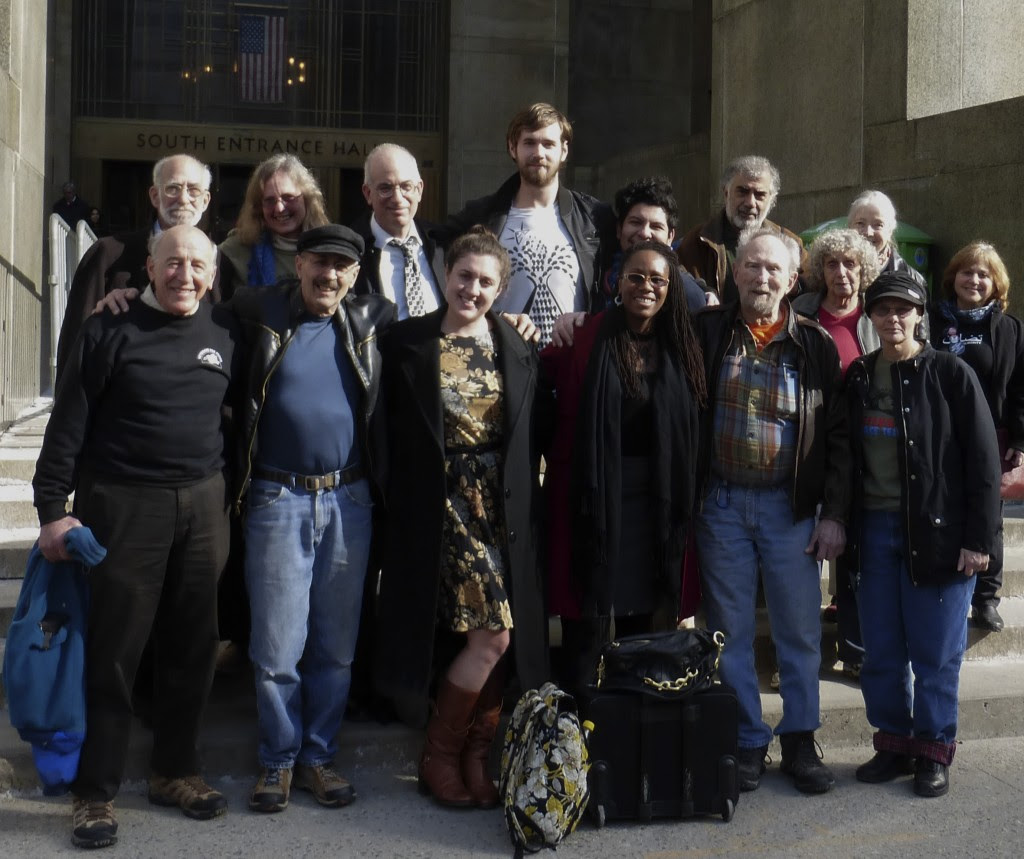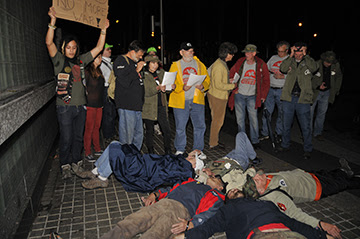By Ellen Davidson
“Unjust laws need to be broken so they will be removed,” is the explanation U.S. Army veteran Ellen Barfield gave for refusing to leave New York City’s Vietnam Veterans Plaza after the 10 pm closing time last October.
She was testifying in her own defense March 11 during the second day of a trial of five veterans arrested at the plaza on Oct. 7, 2013. The defendants were arrested with 14 others (whose charges were later dismissed) as they read the names of the war dead from Iraq, Afghanistan, and Vietnam and laid flowers at the base of the memorial. The five had flex-cuffed themselves together and lay on the ground, and were charged with resisting arrest, obstructing government administration, disorderly conduct, failure to obey a park sign, trespassing, and failure to obey a lawful order. The first two charges, which involved up to a year jail sentence and therefore entitled them to a jury trial, were dropped by Assistant District Attorney Anthony Amanoff March 6, leaving them a bench trial on the remaining four charges before Judge Kevin McGrath.
After the prosecution rested on the morning of March 11, defense attorneys made a motion to dismiss the case because the prosecution had failed to show that the city had addressed the First Amendment burdens raised in the case.
“The minute that we start from an event that involves First Amendment-protected speech, it places the city and the people under a responsibility … of showing a significant government interest in interfering with, regulating, channeling the time, place, and manner of that speech,” argued National Lawyers Guild attorney Jonathan Wallace. Such a showing, he said, “never happened. [The issue of the First Amendment] was met with silence as if it didn’t really apply to the case, but the First Amendment is in fact a cornerstone. It’s federal foundational constitutional law, and it filters down to the New York City street level, and therefore demanded to be discussed by the people’s witnesses.”
“What we heard here,” said Wallace, “is that nobody knows the reason—we asked witness after witness—why this park closes at 10 o’clock at night … and no one has demonstrated a significant government interest.” “What is it about this little park in the middle of public places that are open 24 hours,” asked NLG attorney Martin S. Stolar, “that makes it necessary to restrict the First Amendment?”

Defendants and their lawyers and supporters outside the courthouse March 10. Photo by ELLEN DAVIDSON
Judge McGrath declined to rule on the motion to dismiss, saying he might reconsider the question after hearing the defense case. The only defense witnesses were the five defendants, who made no attempt to deny that they had failed to obey police orders to leave the park, contending that honoring their First Amendment rights was more important than following a park statute.
“We were engaged in our responsibility to live up to the First Amendment of the Constitution,” said World War II infantryman Jay Wenk, 87. When asked if he considered himself above the law, Wenk responded, “I don’t see myself above the law. I pay my taxes, I don’t spit on the floor, I stop on red and go on green, but in my view there was an unjust law that prevents the operation of the First Amendment.”
Citing the oath that members of the military take to protect the Constitution, he said, “When I think of the Bill of Rights, I think of the First Amendment, and that is what I have a responsibility to live by, to serve my own vision of what democracy is.”
Micah Turner, 25, who served in the Army from 2007 to 2012, doing three tours in Afghanistan and one in Iraq, explained that he had been invited to the event to speak about veteran suicides. “I see a stark correlation between the high rate of suicide in the Vietnam conflict as well as in Iraq and Afghanistan,” he told the judge. “I believe the connection is an unjust war, a war of profit.”
Turner said he intended to stay “until our mission [or reading the names of the war dead] was complete. It wasn’t just fallen soldiers. I read the names of suicides. There were more suicides than fallen soldiers from the Vietnam conflict.”
When asked whether he had seen the signs stating the park closing time, he responded, “I believed it was my duty to ignore the signs. I took an oath when I entered the military service to uphold the Constitution, including the Bill of Rights, and I believe it was our duty to respect those who fought for those rights so that we would be able to practice them.”
Police witnesses for the prosecution had asserted that the defendants had come to the park intending to get arrested, but when asked whether he had wanted to be arrested, Ret. Major Ken Mayers, who served in the Marines from 1958 to 1966, said, “I did not. I wished to use my right to free speech.” This was echoed by Tarak Kauff, who said, “One of the things [the police captain] wanted to know was, were we there to get arrested, and I said ‘No, we’re not here to get arrested. We’re here because we have a right to be here. If you want to arrest us, that’s your call.’”
Kauff laid out the reasons the veterans and their supporters had gathered at the memorial that night: “It was 12 years of war in Afghanistan on Oct. 7. We were there to demand that that war be ended, to demand an end to all U.S. wars of aggression , to expose the lies and betrayals that have cost the lives of so many people, men, women, and children around the world, and last but not least, to observe and affirm the right to assemble peacefully.”

Reading the names of the dead while the five defendants lie flex-cuffed on the ground. Photo by ELLEN DAVIDSON
He described the reasons for the protesters’ actions: “The purpose of the reading of the names is to remember and to lament those who have died needlessly so they are not forgotten and so they won’t have died in vain.” The use of flex cuffs represented “a very real symbolism to show that all these people who have died—men women, children, Iraqis, Afghans, Vietnamese, American soldiers—were now forever united in death, permanently, because of these wars.”
When asked why he didn’t leave the park when ordered to by Sixth Precinct Capt. Andrew Lombardo, Kauff said, “I didn’t feel that his orders were more important than the right to assemble.” Asked by Attorney Stolar how he came to that decision, he responded: “Everybody makes those kinds of decisions, everybody that has even done civil disobedience has made that decision. Any unjust law that has ever been overturned has been because people have done civil disobedience, people have stood up to it.”
Closing arguments will be presented tomorrow, followed by a ruling by Judge McGrath. Some of the defendants have already vowed not to accept any fine or community service.
Report on first day of the trial: Veterans’ Free Speech Trial Opens March 10


